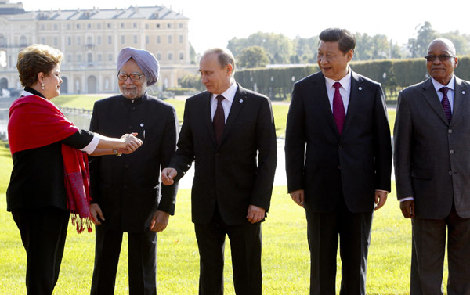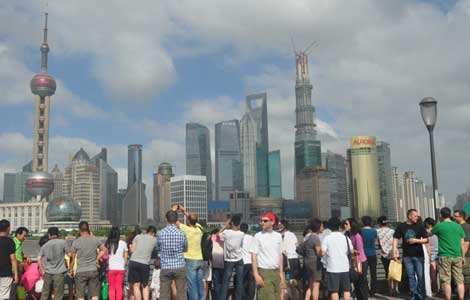Pressure from land prices
Updated: 2013-09-06 07:05
(China Daily)
|
||||||||
The record prices paid by developers for land in Beijing and Shanghai this week will further dampen people's hopes that house prices will fall any time soon and put even more pressure on policymakers to tame prices.
On Wednesday, Sunac China Holdings Ltd, a Hong Kong-listed commercial and residential property developer, bid 2.1 billion yuan ($343 million) to secure a plot of land in eastern Beijing. Since the company has committed to building 278,000 square meters of hospital facilities, the plot's total cost will be more than double. It has been estimated that the average price of an apartment will be more than 100,000 yuan per sq m, factoring in the construction costs, various taxes and fees and the developer's profit margin.
Then the next day, Hong Kong-funded Sun Hun Kai Financial paid 21.77 billion yuan for a plot of land in Shanghai.
In August, the average price of land in Beijing surged to 29,395 yuan per sq m, a 3.22 percent rise month-on-month and a 22.49 percent rise year-on-year. In Shanghai, the average price was 28,979 yuan per sq m, up 1.07 percent from July and 7.71 percent higher from a year ago.
It is a similar story across the country, where new "land kings" are emerging.
With rises in land prices usually a prelude to a new round of real estate price spikes, the news is disheartening for decision-makers who have been under increasing pressure to tame house prices.
For potential homebuyers, the failure of the series of real estate regulations introduced by the government to curb house prices and the record prices being paid for land nationwide are more than discouraging, as it means an apartment remains unattainable.
According to the China Index Academy, a research arm of Soufun, China's largest real estate website, the average price of new apartments in China's 100 major cities was 10,442 yuan per sq m in August, the 15th consecutive monthly rise.
The new record of land prices will also put decision-makers in a dilemma over whether to take harsher action to suppress the red-hot real estate market, as they are aware that dampening the market too much will have a negative effect on the economy, which already faces pressures from its slowing growth.
(China Daily USA 09/06/2013 page15)

 Holder Murray stunned by Wawrinka in US Open quarters
Holder Murray stunned by Wawrinka in US Open quarters
 China, Russia a step closer on gas supply
China, Russia a step closer on gas supply
 18-year-old panda conceives triplets
18-year-old panda conceives triplets
 Testing times for G20 leaders
Testing times for G20 leaders Homemade choppers make aerobatic stunt debut
Homemade choppers make aerobatic stunt debut
 World-class partners bring NBA global games to Chinese fans
World-class partners bring NBA global games to Chinese fans
 Shanghai's visa-free policy lifts tourism
Shanghai's visa-free policy lifts tourism
 Panda twin cub born at Atlanta Zoo
Panda twin cub born at Atlanta Zoo
Most Viewed
Editor's Picks

|

|

|

|

|

|
Today's Top News
Beijing's new product briefing a first for Apple
China, Russia a step closer on gas supply
Brazil asks for apology from US on spying
Japan to test wall for leaking water
Low-budget education abroad for working-class
Shanghai's visa-free policy lifts tourism
Films aim for success abroad
Xi vows economic reform at G20 summit
US Weekly

|

|





